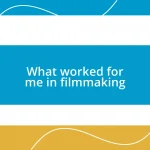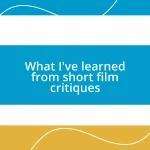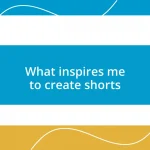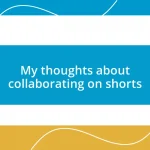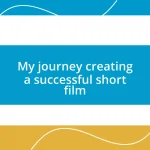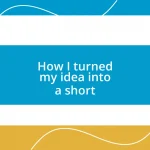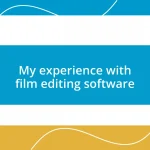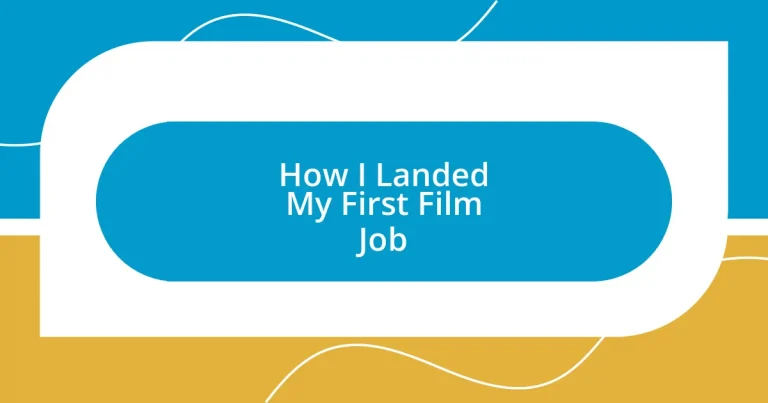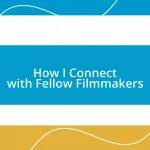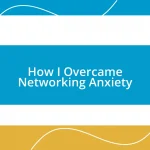Key takeaways:
- Defining career goals with emotional reflection and setting tangible, actionable short-term and long-term aspirations is crucial for clarity and motivation.
- Networking is vital; building genuine relationships and leveraging personal referrals can lead to job opportunities and mentorship.
- Gaining hands-on experience through internships and staying connected with industry professionals can significantly enhance skills and career prospects.
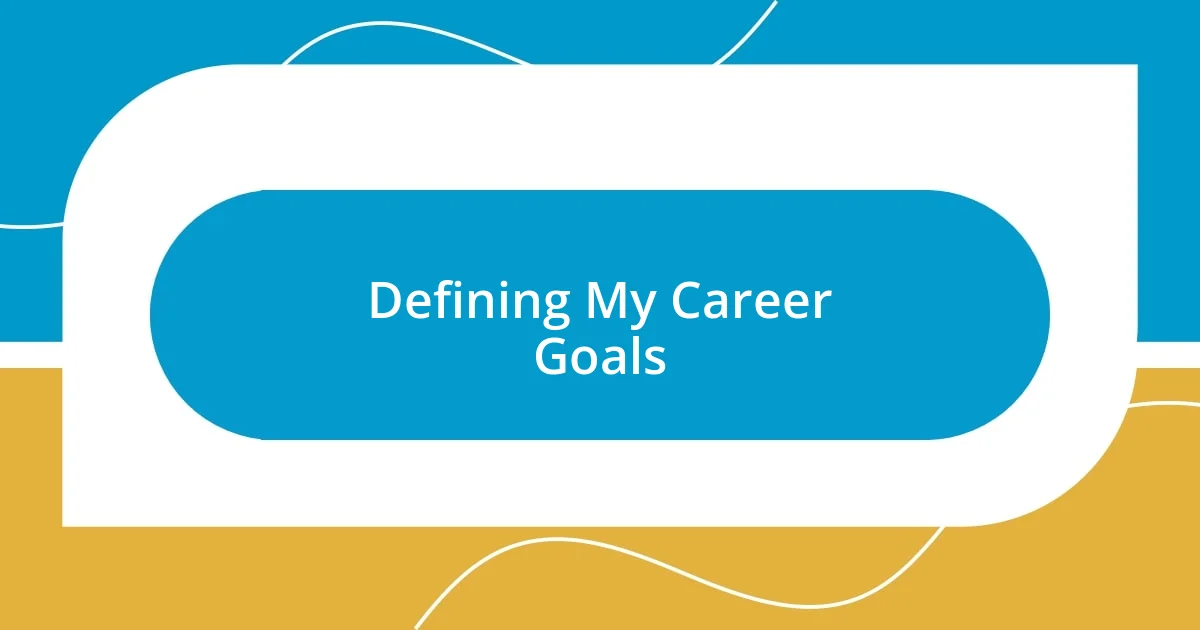
Defining My Career Goals
Defining my career goals was a bit like setting the coordinates for a road trip—I needed to know where I wanted to end up before I could choose the right path. I remember sitting down one rainy afternoon, feeling overwhelmed with possibilities, and asking myself, “What truly excites me in this industry?” That moment of introspection sparked clarity; I realized I wanted to work in narrative filmmaking, where storytelling could transform my passions into visuals.
As I explored my objectives, I checked in with my emotions. I had this burning desire to connect with audiences and provoke thought through my work. Reflecting on a particularly impactful film that moved me deeply, I thought, “How can I create something that inspires the same feelings in others?” That emotional connection became crucial in defining not just what I wanted to do but how I wanted to do it.
Setting tangible, actionable goals came next. I decided to break them down—short-term and long-term aspirations. For example, my immediate goal was to secure an internship that would provide me with hands-on experience. This pragmatic approach kept me motivated and focused, reminding me of my progress and the bigger picture each time I crossed a goal off my list. It’s all about balancing dreams with a strategic game plan, isn’t it?
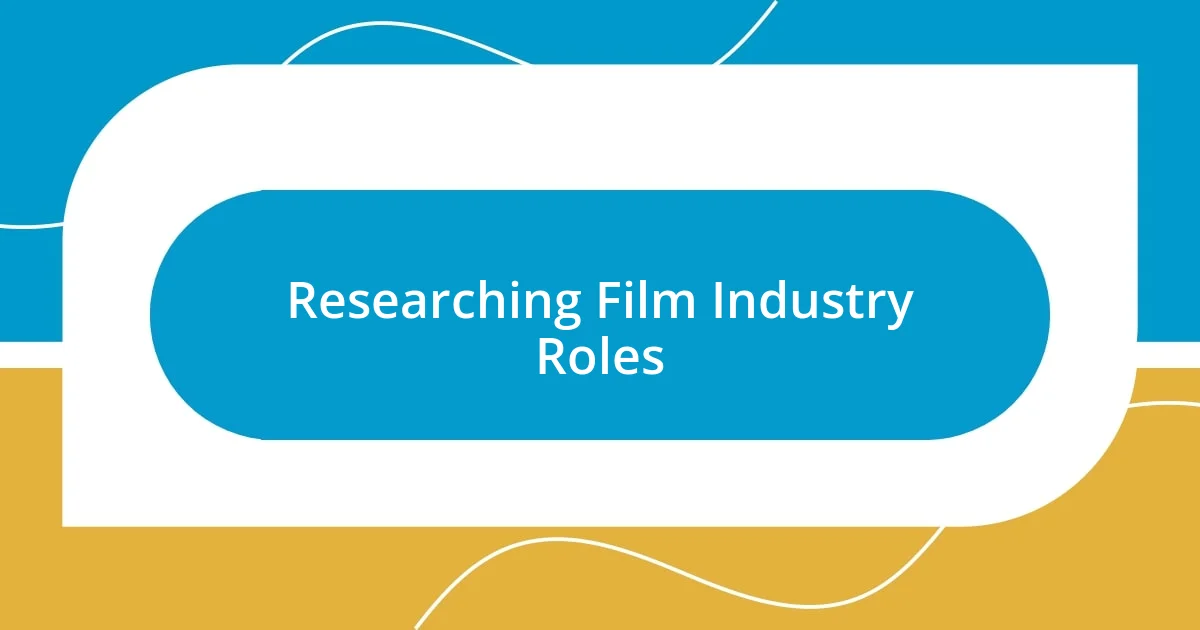
Researching Film Industry Roles
Researching film industry roles is a crucial step towards landing your first job. I remember diving into the vast array of positions like a kid in a candy store. I was fascinated to learn about everything from production assistants to cinematographers and editors. Each role seemed to have its unique set of challenges and rewards, reinforcing the idea that every part of a film’s creation is essential.
Here are some key areas to focus on when researching roles:
- Job Descriptions: Read through various job openings to grasp the responsibilities and skills required.
- Industry Conferences and Workshops: Attend events to network and learn directly from professionals in different roles.
- Informational Interviews: Reach out to those working in positions you’re curious about; their insights can be invaluable.
- Online Resources: Utilize websites, forums, and social media groups dedicated to the film industry for discussions and advice.
- Shadowing Opportunities: If possible, observe different roles in action to see which resonates with you the most.
This gathering of information and practical experiences helped me pinpoint where I wanted to fit within the filmmaking puzzle. By the end of my exploration, I felt empowered to pursue a specific path, knowing I was making a well-informed choice.
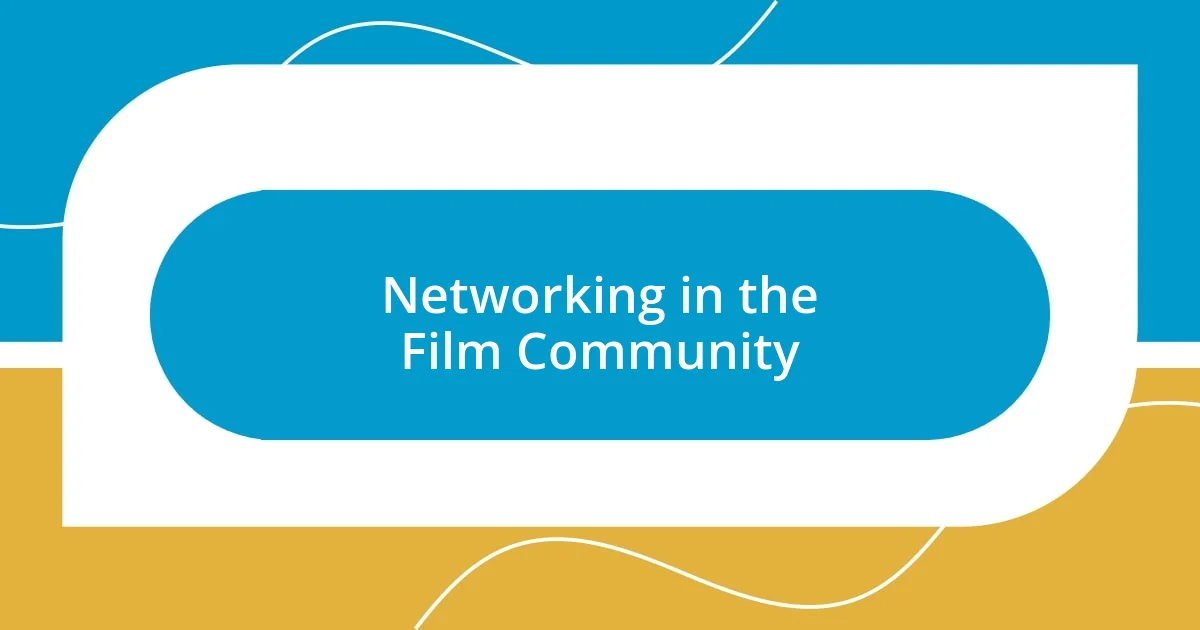
Networking in the Film Community
Networking within the film community is akin to nurturing a garden; it takes time, patience, and genuine effort to cultivate meaningful relationships. I remember attending my first film festival, feeling a mix of excitement and intimidation as I introduced myself to fellow attendees. What struck me was how approachable everyone was—many industry veterans shared their stories, offering advice that I still treasure. Establishing these connections not only opened doors for potential job opportunities, but it also created a support network that I could lean on throughout my journey.
I can’t stress enough the importance of proactively reaching out to others in the industry. One evening, I met a production manager in a casual meet-up after a screening. I mustered the courage to ask about her experiences, and she generously offered to connect me with people looking for interns. That single conversation led to my first significant opportunity. Networking isn’t just about exchanging business cards; it’s about creating authentic bonds that can lead to future collaborations.
When it comes to networking strategies, I found that personal referrals often carry more weight than cold outreach. Consider this: if someone knows you through a mutual acquaintance, they might be more likely to give you a chance. I recall a time when a friend introduced me to a director at a party. The director promptly invited me to shadow her on set, a rare opportunity I would have missed if I had relied solely on my own efforts. This experience taught me that a warm introduction can significantly enhance your chances of being noticed in the competitive film landscape.
| Networking Strategies | Benefits |
|---|---|
| Film Festivals | Meet industry professionals, learn about trends |
| Social Media | Connect with filmmakers and engage in discussions |
| Informational Interviews | Gain insights and advice from experienced individuals |
| Mutual Connections | Leverage introductions for credibility and opportunity |
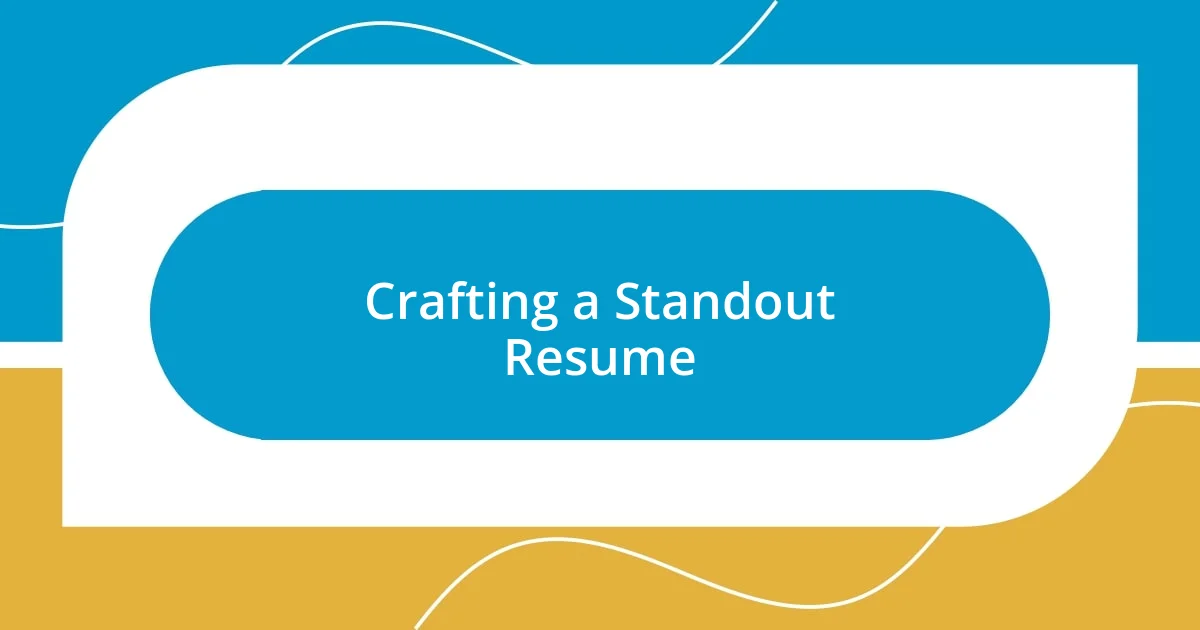
Crafting a Standout Resume
When I began crafting my resume, my goal was to highlight not just my academic credentials but also my genuine passion for filmmaking. I distinctly remember the moment I realized that listing coursework and technical skills wasn’t enough. I decided to include a section dedicated to my relevant projects, showcasing my involvement in student films and any volunteer work on sets. This experience revealed something important: potential employers want to see that you’re proactive and willing to get your hands dirty.
As I tailored my resume for a production assistant role, I focused on using action verbs and quantifying my experiences whenever possible. For instance, instead of simply stating that I “assisted in filming,” I wrote, “Collaborated with a team of five to capture over 30 hours of footage for a short film.” This shift in language made my contributions feel tangible and impactful. I encourage you to ask yourself: What specific value did you bring to your past projects? Articulating this clearly can make your resume resonate more with hiring managers.
Lastly, never underestimate the power of design in a resume. I opted for a clean, visually appealing layout that reflected my artistic side, opting for subtle colors and clear sections that guided the eye. It felt like my resume was an extension of my personality. I think about how a captivating resume can be your first opportunity to make a memorable impression. Are you showcasing not just what you’ve done, but who you are? Focusing on that balance can truly help your application stand out.
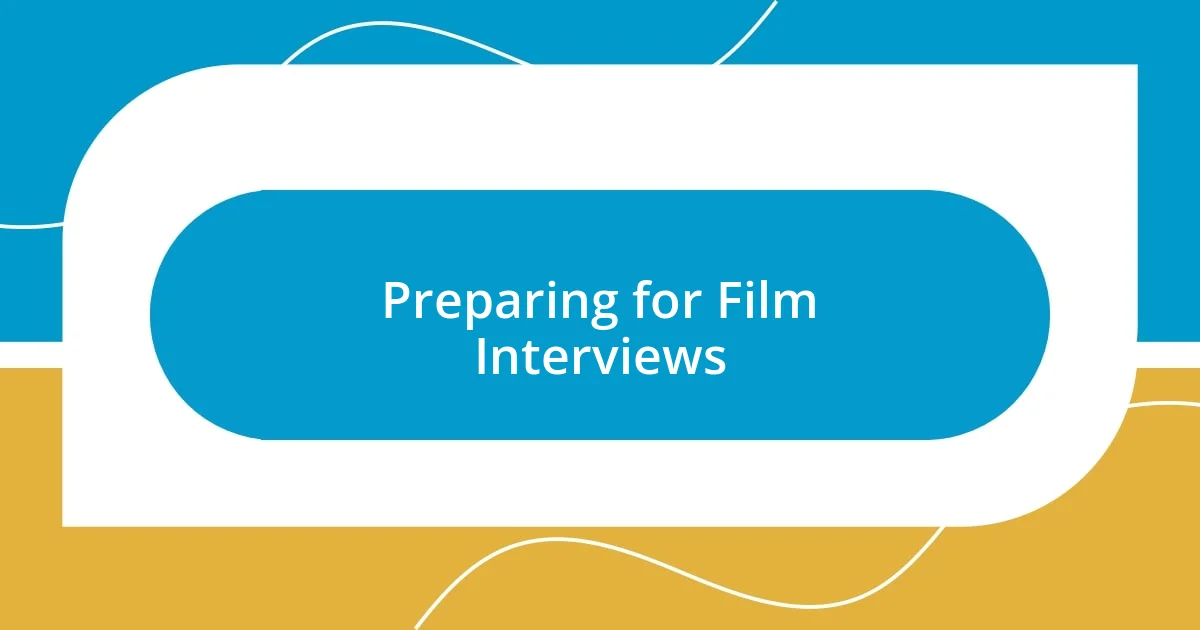
Preparing for Film Interviews
Preparing for film interviews is a crucial step that often gets overlooked. I remember my first interview vividly—the butterflies in my stomach were relentless. To calm my nerves, I practiced common interview questions in front of a mirror, which surprisingly made a huge difference in my confidence level. It felt like I was in the driver’s seat rather than just a passenger on an intimidating ride.
Researching the project and the team beforehand is also essential. I recall digging into the background of the film I was interviewing for, which allowed me to ask informed questions during the interview. This demonstrated my genuine interest and made the conversation more engaging. Have you ever gone into an interview feeling unprepared? Trust me, knowing the story behind the film can set you apart and show that you’re not just looking for any job—you’re looking for this job.
Additionally, I found that dressing appropriately can impact how I felt and presented myself. For my first on-set interview, I chose a smart-casual outfit that balanced professionalism with my personal style. I still think about how that choice helped me project the right confidence. What impression do you want to create? Dressing the part is just as vital as knowing your resume—it impacts not only the interviewer’s perception but how you feel about yourself in that moment.
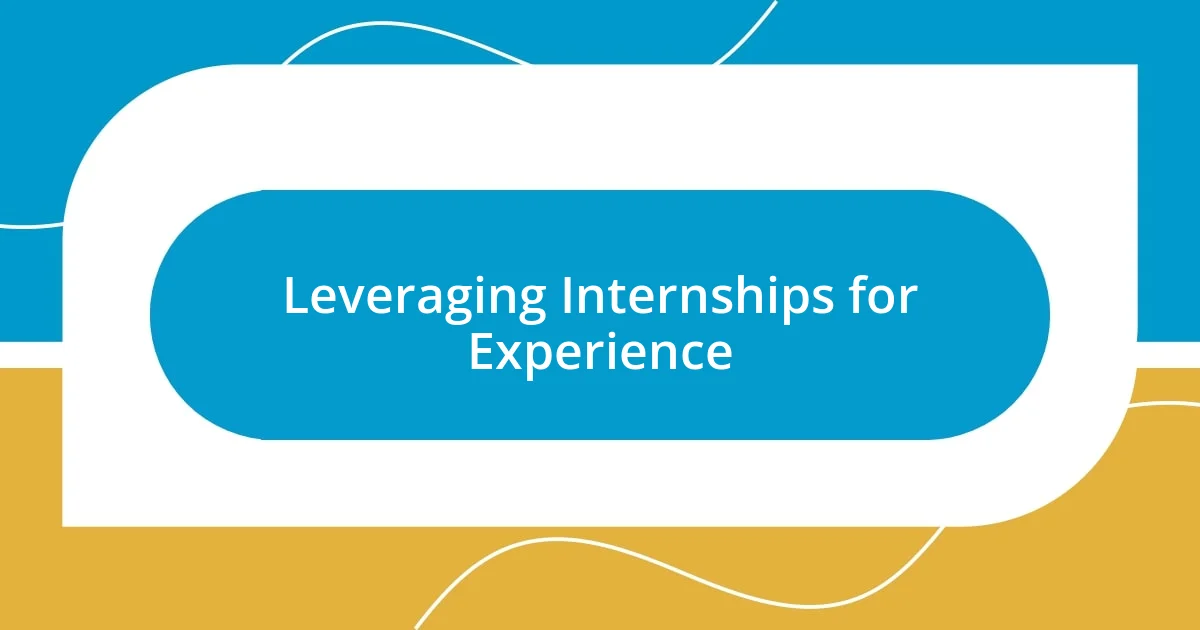
Leveraging Internships for Experience
Internships can be a game-changer in the film industry. I remember landing my first internship with a local production company; it felt like stepping into a new world where theory met practice. I was eager to learn and contribute, which is essential because showing that enthusiasm can lead to greater responsibilities. Have you ever wondered how to make the most of these opportunities? Being proactive during an internship often leads to networking chances that might not come easily otherwise.
During my internship, I immersed myself in every aspect of the production process, from assisting with camera setups to helping with script revisions. That hands-on experience not only boosted my skills but also gave me a real sense of the industry’s pace and challenges. I still think about those moments when I took the initiative to suggest improvements—it taught me how important it is to speak up and contribute ideas. How often do you take the chance to voice your thoughts? Realizing that your input can be valuable is a lesson that goes beyond your internship.
Additionally, I made it a point to stay connected with the people I met during my internship. After wrapping up my time there, I followed up with my supervisors and colleagues through LinkedIn, which turned out to be a wise move. Those connections not only kept me in the loop about future job openings but also provided mentorship that has been invaluable. Have you considered how building these relationships can shape your career path? I can attest that networking doesn’t just happen at fancy events—it often starts in the trenches, where you’re working alongside passionate people who share your dreams.
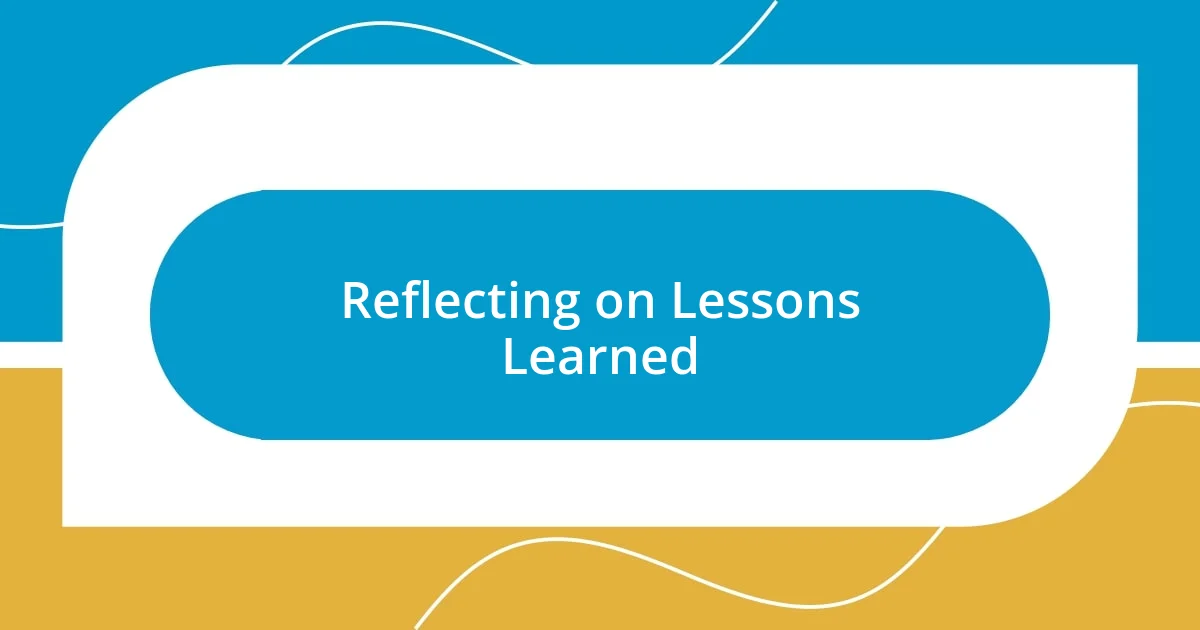
Reflecting on Lessons Learned
Reflecting on the journey to landing my first film job, I can’t help but appreciate the importance of resilience. Early on, I faced rejection after rejection, and it stung every time. Those moments taught me a vital lesson—perseverance can often be your best ally in this competitive industry. Have you ever felt like giving up? I certainly did, but each setback motivated me to refine my skills and seek out new opportunities.
I also learned that adaptability is crucial. There was a time when I were thrown into various roles, from production assistant to script supervisor, and it felt a bit overwhelming. Yet, embracing those shifts not only expanded my skill set but also opened unexpected doors. How do you react when circumstances change? For me, learning to thrive under pressure transformed challenges into stepping stones toward growth. It’s this flexibility that can help you stand out in an industry that’s always evolving.
Lastly, the value of collaboration struck me like a lightning bolt. I recall working with a diverse team where the exchange of ideas flowed freely, and it was exhilarating. That experience drilled into me the understanding that filmmaking is a collective art form. Have you ever worked on a team that sparked magic? It was through listening to others and valuing their perspectives that I realized the true power of collaboration in bringing creative visions to life.
